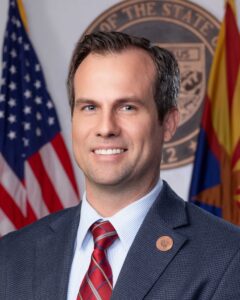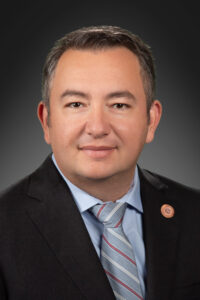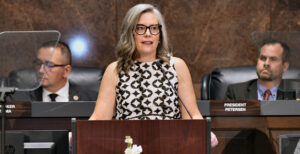A federal judge has tossed out a bid by Republican state lawmakers to overturn the designation of nearly a million acres of federal land near the Grand Canyon that the Biden administration had dedicated as a national monument.
In a ruling filed Jan. 27, U.S. District Court Judge Stephen McNamee said Senate President Warren Petersen and Ben Toma, the former speaker of the House, lack standing to even bring a claim in federal court over creation last year of the Baaj Nwaavjo I’tah Kukveni Ancestral Footprints of the Grand Canyon National Monument. That right, the judge said, belongs to the executive branch.
More to the point, neither Gov. Katie Hobbs nor Attorney General Kris Mayes chose to challenge the 2023 designation. And McNamee said that doesn’t entitle lawmakers to hire their own attorneys and step in.
But the win could lead to another legal fight.
President Trump, in his first term in office, announced he was cutting the size of the Grand Staircase-Escalante National Monument in Utah in half. And he also trimmed the Bears Ears National Monument by 85%.
Those cuts were restored when Biden took office in 2021, though there still is a pending lawsuit over that legal question.
But Perry Wheeler, spokesman for Earthjustice, which sought to intervene in this case and is involved in the Utah litigation, said any move by Trump would be illegal.
“Nothing in the Antiquities Act (which allows a president to create monuments) authorizes a president to remove parcels of land from a national monument, or otherwise to diminish or dismantle an existing monument,” he said.
A spokesman for Steve Montenegro, who succeeded Toma, said the new speaker is “reviewing the ruling and evaluating next steps.”
Petersen said the state is likely to appeal.
“We are confident this unconstitutional land grab will be reversed either by the courts or by the Trump administration,” he said.
But the ruling cheered Mayes,
“I speak for the state in federal court,” she said, calling the actions by Petersen and Toma a “blatant attempt at a power grab in this case overstepped their authority and wasted taxpayer resources.”
This case stems from a lawsuit filed last year by the pair who called Biden’s actions an illegal “land grab.”
Both acknowledged that the 1906 federal Antiquities Act does allow a president to set aside parcels of federal land, which is solely what is involved here, for protection.
But they say such a proclamation has to be limited to historic landmarks, historic and prehistoric structures and other objects of historic or scientific interest. More to the point, they argue that such designations have to be confined to the “smallest area compatible” with the care and management of the items to be protected.
And they contend the Baaj Nwaavjo I’tah Kukeveni Ancestral Footprints of the Grand Canyon National Monument, the formal name for 1,462 square miles of the site which the White House says translates in part in the Havasupai language to “where indigenous peoples roam” and in Hopi to “our ancestral footprints,” meets neither requirement.
“Congress passed the Antiquities Act to protect just that: antiquities,” the lawsuit says. “It did not pass the law to allow the Biden administration to declare every inch of federal land a federal forest, cut off from all but those it selects.”
They also argued that there is damage to the state from everything from the inability to manage adjacent state trust lands to the loss of jobs and revenue because uranium mining would not be allowed.
McNamee said all that is irrelevant.
“The Legislature is not authorized to bring claims on behalf of the state,” he wrote.
“Arizona law expressly provides that the attorney general is tasked with representing the state in any action in federal court,” the judge said. “Consequently, litigating on the state’s behalf is the prerogative of the executive branch, not the Legislature.”
And Hobbs was not interested in such a challenge, having actually urged Biden to create the monument.
Attorneys for lawmakers, hoping to get around that, told McNamee they were not suing on behalf of the state but on behalf of the Legislature and the damages it would sustain, things like having to spend time and money addressing the impact of the proclamation. The judge, however, said there is no precedent for such a claim.
He was no more impressed by claims that creation of the monument also created a right to the water necessary to sustain it.
McNamee said nowhere do the lawyers for the Legislature attempt to quantify what water might be needed and how any of that results in a “concrete injury” to the state. And he pointed out that the proclamation itself says “nothing in this proclamation shall be construed to alter the valid existing water rights of any party.”
The judge also dismissed claims that creation of the monument will impact uranium mining. He noted that none has been allowed since at least 2012 when the Secretary of Interior withdrew pretty much the same federal lands from mining through 2032, if not beyond, a decision that was upheld by a different federal judge.
Legislative leaders had one other argument. They said if uranium deposits become inaccessible within the monument that undermines the ability of Arizona utilities to get the fuel they need for their power plants.
“A significant portion of energy produced and consumed in Arizona comes from nuclear power,” the attorneys for lawmakers argued, with the figure in 2022 hitting 29% of total electricity net generation in the state.
What makes that important, the lawsuit said, is that, for the moment, domestic nuclear energy production is dependent on foreign imports of uranium. And that, GOP leaders said, puts nuclear power at risk if foreign nations suspend uranium exports to the United States.
“There is every reason to believe such a risk exists,” Petersen and Toma said. “Many uranium imports come from foreign companies owned by nations, like Russia, with interests adverse to the interests of the United States and who ‘leverage’ their control over those companies `to further geopolitical ambitions.’ ”
McNamee sniffed at all that.
“This argument is exceedingly speculative,” he wrote. “The court concludes that legislative plaintiffs’ fears of potential geopolitical shifts that may impact domestic uranium process in the future are inadequate to support an injury-in-fact,” McNamee said, the standard for filing suit.
Attorneys for the Department of Justice also had asked the judge to rule that only Congress, and not the president, has the power to undo a national monument. McNamee declined, saying it was sufficient for him to rule that the challengers in this case lack standing to sue.
































